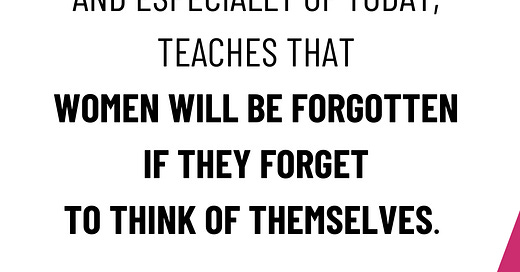A History of Women and Pseudonyms
Publishing under a woman’s own name was once a radical act and it explains why women can sometimes be hard to find.
Hello and happy Thursday to you!
Let’s start with a little reminder 👇
With that cleared up, I want to talk to you about Women Who Collect Women’s Stories – the theme of this month. Specifically, women historians.
You’ll remember last summer that I accidentally stumbled onto a whole new world of women historians from the past. In finding these women, I hoped that I would also find a continuous line of woman-centred histories. (People tend to write about things that resonate with them, right?) NGL, I was disappointed to find lots of histories written by women in the style of the ‘grand narrative,’ rather than focusing on women’s experiences of the past. In some cases, they didn’t mention women at all.
(In case you’re wondering, the ‘grand narrative’ is exactly what you might expect: these are big, broad histories of a period. They are told from the top-down perspective, usually with a focus on royalty and big, sweeping themes, like politics).
What I now know about this topic is that had I persisted, I would have found exactly what I was looking for.
With that in mind, let me share the number one reason why it was so bloody difficult to find women historians who wrote about women.
Ready?
When Women Couldn’t Say They Were Women
Pseudonyms, dear reader.
God(dess), it seems so obvious now.
Like, did I really think that women historians would just do something as outrageous and obvious as publish under their own name?!
I mean, what planet had I temporarily moved to?
But, I digress. Let’s not dwell on the past (says the historian 😂😂😂).
Let’s stick to the historical reality that is the pseudonym.
Now, if you know anything about the history of literature, you’ll know that women often wrote under a name that wasn’t their own. There were lots of reasons for this, and it’s important to not superimpose a ‘grand narrative’ onto all female writers from the past. But we can broadly summarise some of the biggies:
To appeal to (male) publishers.
To appeal to readers (of all genders).
To avoid public scrutiny (which was usually gendered).
To avoid being famous.
Fun fact: when Charlotte Brontë sent a selection of her poems to Robert Southey (also a poet), this is how he responded:
“Literature cannot be the business of a woman’s life, and it ought not to be. The more she is engaged in her proper duties, the less leisure she will have for it even as an accomplishment and a recreation.”
Why Women Used Pseudonyms
When we talk about pseudonyms, there are lots of types to consider:
Some women published under a false woman’s name. (The poet, Mary Robinson, published under the name ‘Tabitha Bramble,’ for instance).
Some women published under no name at all or something more abstract, like ‘A Lady.’ I’m pretty sure Jane Austen did this when she published Sense and Sensibility. Another great example is Mary Elizabeth Braddon who published Lady Audley’s Secrey as ‘M. E. Braddon.’ BTW, this novel is one of my favourites from the 19th century.
Some women walked between two worlds. For example, Ellen Wood published her novel, East Lynne, under the guise of ‘Mrs Henry Wood.’ Another stellar novel from the 19th century, BTW.
As an aside, it’s interesting that Black women writers from this period tend not to go down this route. Phyllis Wheatley, for example, published under her own name, as did Mary Prince. However, a word of caution here: this wasn’t *just* about Black women having a high level of (public) creative confidence. Arguably, publishers may have encouraged this practice because of the ‘exotic’ connotations of Blackness, especially Black femininity. Also, let’s not forget that many works written by Black women were connected to wider social reform movements, so publishing under their own name added legitimacy to the cause.
Pseudonyms and Female Historians
So, I found plenty of examples of women historians using pseudonyms, arguably for the same reasons as women writers. For example, in 1761, Sarah Scott wrote her history of Gustavus Ericson under the name of ‘Henry Raymond.’ This made her very difficult to find because, unlike the women writers whose legacies have survived to the present day, women historians tended to be (ironically) written out of history.
And just to make things a million times more complicated, history has something that literature doesn’t: a plethora of names to call a woman historian.
I’ve found all sorts of names, including a “fair historian” and “lady historian.”
But my all-time favourite is this one …
Spotted in a dictionary from 1881:
Sadly, the term “historianess” was rejected by women historians in the 1890s but I’m 100% here for it …
Until next time,
A Great Historianess, A Most Charming, Delightful Woman x
😜😂






Very interesting! I learned much about the challenges women have faced publishing their work and receiving credit for it. I am always amazed how ignorant or naive I am about so many things. How revealing is that quote from Robert Southey! I think we have a good many men that still agree with Southey - I think we call them morons. I like pseudonyms. My grandfather wrote and published well over a hundred books during his long career as a wildlife and children's author. He wrote mystery novels and war stories to bolster morale during WWII, but he refused to use his own name, as he did not want to be identified with anything except wildlife and children's literature. Some of the pseudonyms he invented were funny! I should have asked him where he came up with some of these names. Keep up the great herstory lessons!